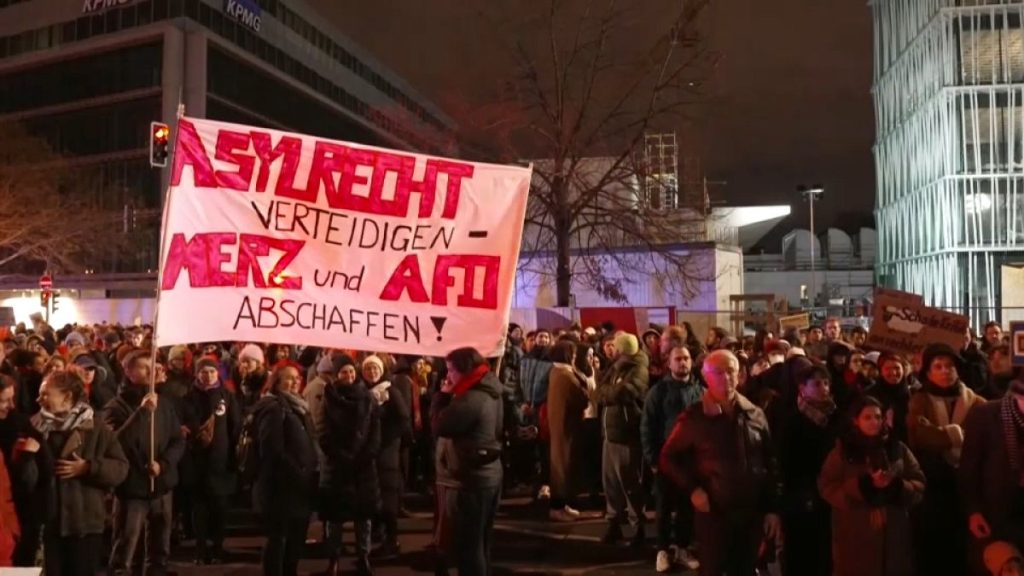The political landscape in Germany has been dramatically reshaped by a recent vote in the Bundestag on stricter migration policies, sparking protests and raising concerns about the erosion of democratic norms. Hundreds gathered in Berlin outside the headquarters of the Christian Democratic Union (CDU), protesting the passage of a motion that would significantly tighten border controls and increase the number of migrants turned back at Germany’s borders. The demonstration, organized by groups like Amnesty International and Seebrücke, reflects the widespread unease over the policy shift and its implications for human rights and the political climate. The core issue lies in the controversial manner in which the motion was passed, relying on the support of the far-right Alternative for Germany (AfD) party.
The push for stricter migration controls was spearheaded by CDU leader Friedrich Merz, who brought the issue to the forefront following a tragic knife attack perpetrated by a rejected Afghan asylum seeker. Merz presented two non-binding motions to parliament, advocating for increased security measures and the closure of German land borders to irregular migration. While the second, more comprehensive motion outlining restrictive reforms and enhanced security powers was rejected, the first motion, focused on increased border rejections, narrowly passed with the crucial backing of the AfD. This alliance has shattered the previously maintained “firewall” against cooperation with the far-right, a principle upheld by mainstream parties to isolate extremist ideologies. The CDU’s willingness to accept support from the AfD has ignited a firestorm of criticism and accusations of legitimizing a party widely viewed as xenophobic and anti-democratic.
The political implications of this vote are far-reaching, particularly in light of the upcoming federal elections. The CDU, currently leading in the polls, faces accusations of compromising its values for political expediency. The AfD’s growing popularity, reflected in its second-place standing in pre-election surveys, adds another layer of complexity to the situation. The vote has not only exposed the fragility of the political center but also raised questions about the future direction of German politics. The willingness of the CDU to collaborate with the AfD, even on a single motion, suggests a potential shift in the political landscape, blurring the lines between mainstream conservatism and far-right populism.
The controversy surrounding the vote highlights the deep divisions within German society regarding migration and national identity. The tragic incident that precipitated the debate has intensified fears about security and fueled anti-immigrant sentiment, creating fertile ground for the AfD’s rhetoric. The CDU’s decision to capitalize on this sentiment by pushing for stricter migration controls, even at the cost of collaborating with the far-right, reflects a calculated political maneuver. However, this strategy carries significant risks, potentially alienating moderate voters and further polarizing the electorate.
The protests in Berlin and the widespread condemnation from human rights organizations underscore the significant opposition to the CDU’s approach. Critics argue that the new policy not only violates fundamental human rights but also risks further marginalizing vulnerable populations. The collaboration with the AfD is seen as a dangerous precedent, normalizing extremist ideologies and undermining democratic principles. The ramifications of this vote extend beyond the immediate policy changes, raising fundamental questions about the future of German politics and the role of far-right parties in shaping the national discourse.
The upcoming elections will serve as a critical test of the German electorate’s response to this political realignment. Will the CDU’s embrace of stricter migration controls and its tacit alliance with the AfD resonate with voters, or will it be met with a backlash? The outcome will determine the trajectory of German politics in the coming years and the future of the country’s commitment to human rights and democratic values. The events surrounding this vote serve as a stark reminder of the fragility of democratic institutions and the constant vigilance required to protect them from the encroachment of extremist ideologies. The debate also highlights the complex and often emotionally charged nature of migration policy, demanding a nuanced approach that balances security concerns with humanitarian considerations.










